HappeningsBreaking News
From Mumbai to quarantine facility in Silchar, tale of a traveller

June 29: Travelling in the days of pandemic really seems not to be less intriguing than any horror movie, where the person is constantly under duress of getting contaminated. However, most persons travelling at this juncture is doing so under compulsion. The tension becomes multiplied when one is travelling from or to any hotspots. Here we narrate the tale of one such person, who started from Mumbai with all precautions and reached Silchar to be placed under institutional quarantine facility. The traveller, Gobinda Das narrates his experience while he was in quarantine centre in Silchar…..
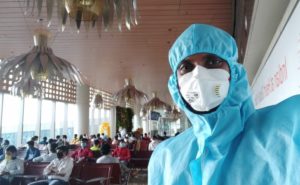 Many from Barak Valley resides and work in various parts of the country, far away from their home, leaving afar their kith and kin. I too belong to that lot and had been residing in Mumbai, the commercial capital of India since more than a decade to earn my livelihood. Never ever did I experience such a wild thought that the country would be engulfed with such a deadly virus. I was all prepared to come back to my home in Silchar towards the end of March. However, with the declaration of nationwide lockdown, the flight services also came to a halt and I had but no other option but to wait for almost three months for Unlock 1.0.
Many from Barak Valley resides and work in various parts of the country, far away from their home, leaving afar their kith and kin. I too belong to that lot and had been residing in Mumbai, the commercial capital of India since more than a decade to earn my livelihood. Never ever did I experience such a wild thought that the country would be engulfed with such a deadly virus. I was all prepared to come back to my home in Silchar towards the end of March. However, with the declaration of nationwide lockdown, the flight services also came to a halt and I had but no other option but to wait for almost three months for Unlock 1.0.
 The 3 odd months I spent in Mumbai was as if staying in a ‘ghost house’. Everyday the number of cases were surging high. I had already left my job and made up my mind to come back alive to my home in Silchar. The image of my 6 months old baby in Silchar always flashed before my eyes. Mumbai witnessed strict lockdown and I too followed COVID-19 protocol religiously. With the resuming of passenger flights, I was fortunate to manage tickets to fly back home on 22 June.
The 3 odd months I spent in Mumbai was as if staying in a ‘ghost house’. Everyday the number of cases were surging high. I had already left my job and made up my mind to come back alive to my home in Silchar. The image of my 6 months old baby in Silchar always flashed before my eyes. Mumbai witnessed strict lockdown and I too followed COVID-19 protocol religiously. With the resuming of passenger flights, I was fortunate to manage tickets to fly back home on 22 June.
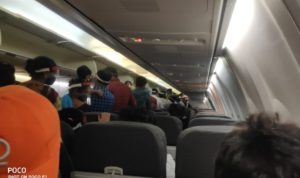 As the day of my journey by SpiceJet from Mumbai approached, another tension gripped my mind. I feared being contaminated during the journey. Somehow I then managed to purchase a set of PPE Kit and around 2 litres of sanitiser. On reaching the airport at around 2 PM on 22 June, I was somewhat composed seeing the COVID protocol followed inside Mumbai Airport. All my luggage were thoroughly sanitised. Thermal screening was also done. Majority of the stalls inside the airport were closed. I kept on applying hand sanitiser at regular interval. Wearing the PPE kit and N95 and staying for such long hours is indeed a great ordeal, but that was probably the only way I could have kept myself safe.
As the day of my journey by SpiceJet from Mumbai approached, another tension gripped my mind. I feared being contaminated during the journey. Somehow I then managed to purchase a set of PPE Kit and around 2 litres of sanitiser. On reaching the airport at around 2 PM on 22 June, I was somewhat composed seeing the COVID protocol followed inside Mumbai Airport. All my luggage were thoroughly sanitised. Thermal screening was also done. Majority of the stalls inside the airport were closed. I kept on applying hand sanitiser at regular interval. Wearing the PPE kit and N95 and staying for such long hours is indeed a great ordeal, but that was probably the only way I could have kept myself safe.
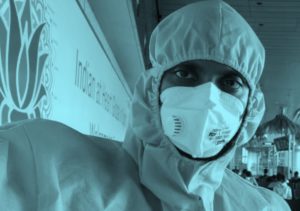 On entering the aircraft, I once again sprayed sanitiser on my seat and hands. SpiceJet gave us face-shields. With PPE kit, all were staring at me. The flight left Mumbai Airport at 7.45 PM and reached Kolkata at 11 PM. It was at Kolkata Airport that the real ordeal started. I could find a huge contrast in the safety measures adopted in Mumbai and Kolkata Airport. My flight for Silchar was in the next morning. I somehow convinced the CISF personnel on duty and went inside the boarding lounge. It was a horrible experience there. There were a sea of passengers in the boarding lounge with limited number of chairs to sit. Many were sleeping on the floor. Social distancing was not at all maintained. It seemed more like a railway platform than an Airport. Some passengers who came in my same flight and whose destination was till Kolkata merrily went out of the airport without any scrutiny in place. I just wondered how suicidal it was! Inspite of travelling from corona hotspot (Mumbai), none in Kolkata airport bothered to keep any record of the passengers entering the “city of joy.”
On entering the aircraft, I once again sprayed sanitiser on my seat and hands. SpiceJet gave us face-shields. With PPE kit, all were staring at me. The flight left Mumbai Airport at 7.45 PM and reached Kolkata at 11 PM. It was at Kolkata Airport that the real ordeal started. I could find a huge contrast in the safety measures adopted in Mumbai and Kolkata Airport. My flight for Silchar was in the next morning. I somehow convinced the CISF personnel on duty and went inside the boarding lounge. It was a horrible experience there. There were a sea of passengers in the boarding lounge with limited number of chairs to sit. Many were sleeping on the floor. Social distancing was not at all maintained. It seemed more like a railway platform than an Airport. Some passengers who came in my same flight and whose destination was till Kolkata merrily went out of the airport without any scrutiny in place. I just wondered how suicidal it was! Inspite of travelling from corona hotspot (Mumbai), none in Kolkata airport bothered to keep any record of the passengers entering the “city of joy.”
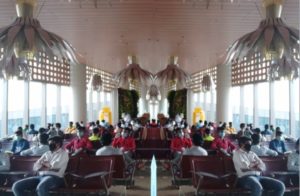 Somehow, I passed the night in my PPE kit and in the morning boarded the SpiceJet flight for Silchar. By the time, the 2 litres of hand sanitiser which I carried with me was almost reduced to half. Even inside the flight, I sanitised my hands almost every 20 minutes. At around 11 AM on 23 June, I reached Silchar. On getting down, I was initially tensed being reminded of the mismanagement which I witnessed in Kolkata airport. But then, when I came to collect my luggage, my conception changed.
Somehow, I passed the night in my PPE kit and in the morning boarded the SpiceJet flight for Silchar. By the time, the 2 litres of hand sanitiser which I carried with me was almost reduced to half. Even inside the flight, I sanitised my hands almost every 20 minutes. At around 11 AM on 23 June, I reached Silchar. On getting down, I was initially tensed being reminded of the mismanagement which I witnessed in Kolkata airport. But then, when I came to collect my luggage, my conception changed.
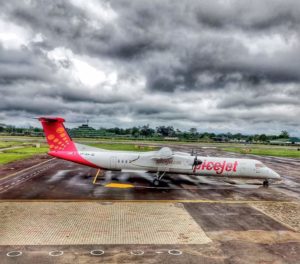 Silchar Airport seemed to be a well guarded one, judging from the viewpoint of COVID-19 protocol. All these days, I had seen in news channels and heard from people about the dynamic role played by Assam Health Minister, Dr. Himanta Biswa Sarma in containing the spread of coronavirus. On 23 June, I experienced the dynamism of our Health Minister as in Silchar Airport an elaborate COVID-19 protocol was put in place. Circles were marked with 6 feet distance in between for passengers to stand in queue. The luggage was sanitised, hand sanitiser was also provided. After thermal checking, we were then asked to proceed towards another counter where our details were recorded. We were given tokens at this stage and our names were called aloud in microphone maintaining the serial. Every passenger were asked whether they would opt for paid quarantine or be put under facility quarantine.
Silchar Airport seemed to be a well guarded one, judging from the viewpoint of COVID-19 protocol. All these days, I had seen in news channels and heard from people about the dynamic role played by Assam Health Minister, Dr. Himanta Biswa Sarma in containing the spread of coronavirus. On 23 June, I experienced the dynamism of our Health Minister as in Silchar Airport an elaborate COVID-19 protocol was put in place. Circles were marked with 6 feet distance in between for passengers to stand in queue. The luggage was sanitised, hand sanitiser was also provided. After thermal checking, we were then asked to proceed towards another counter where our details were recorded. We were given tokens at this stage and our names were called aloud in microphone maintaining the serial. Every passenger were asked whether they would opt for paid quarantine or be put under facility quarantine.
 Moreover, obeying the flying protocol of the state government, many were sent for home quarantine also. I opted for institutional quarantine facility. It was then that I proceeded towards another counter, where my swab sample was taken. The entire process took around 2 hours time. A vehicle was then provided in which I was taken to NIT Silchar. There I was quarantined in Hostel No.2. All of us were provided single rooms with attached bathroom. By the time, we reached NIT, it was 3 PM. We were then provided biscuits, cake and tea. Each of us were also given a bucket, mug and soap. The room and the bathroom were totally clean. Water and electricity were available round the clock.
Moreover, obeying the flying protocol of the state government, many were sent for home quarantine also. I opted for institutional quarantine facility. It was then that I proceeded towards another counter, where my swab sample was taken. The entire process took around 2 hours time. A vehicle was then provided in which I was taken to NIT Silchar. There I was quarantined in Hostel No.2. All of us were provided single rooms with attached bathroom. By the time, we reached NIT, it was 3 PM. We were then provided biscuits, cake and tea. Each of us were also given a bucket, mug and soap. The room and the bathroom were totally clean. Water and electricity were available round the clock.
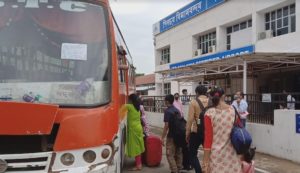 I have heard many stories about deplorable condition of quarantine facilities, but here I could experience myself a good, clean and hygienic environment. At 8.30 PM, we were provided dinner. The menu included sufficient quantity of rice, dal, potato fry, mixed vegetable and egg curry. We were also provided 3 litres of packaged water per day. On request, I was also later on provided extra water. the food was quite good and hygienic. The next morning, we were provided breakfast at 8 AM. They gave a cup of tea, boil egg, 4 puri and a curry. Lunch was served to us at 1 PM and I was amazed to find rice, dal, vegetable curry, gourd fry and rui fish. I just wondered whether even in our home, how far we have our meals at a fixed time everyday with non-veg items! I cannot say why people were grumbling about the quality of food because my own personal experience was indeed a positive one.
I have heard many stories about deplorable condition of quarantine facilities, but here I could experience myself a good, clean and hygienic environment. At 8.30 PM, we were provided dinner. The menu included sufficient quantity of rice, dal, potato fry, mixed vegetable and egg curry. We were also provided 3 litres of packaged water per day. On request, I was also later on provided extra water. the food was quite good and hygienic. The next morning, we were provided breakfast at 8 AM. They gave a cup of tea, boil egg, 4 puri and a curry. Lunch was served to us at 1 PM and I was amazed to find rice, dal, vegetable curry, gourd fry and rui fish. I just wondered whether even in our home, how far we have our meals at a fixed time everyday with non-veg items! I cannot say why people were grumbling about the quality of food because my own personal experience was indeed a positive one.
 Everyday at around 9.30, cleaners wearing PPE kit used to come and collect the garbage from our rooms. I was indeed very frustrated to note that few people quarantined there were throwing empty water bottles and food packets here and there instead of throwing the same in the dustbin provided inside every room. I just wondered at the moment that before blaming the government every now and then, we ourselves should imbibe civic sense and help the administration in maintaining the COVID protocol.
Everyday at around 9.30, cleaners wearing PPE kit used to come and collect the garbage from our rooms. I was indeed very frustrated to note that few people quarantined there were throwing empty water bottles and food packets here and there instead of throwing the same in the dustbin provided inside every room. I just wondered at the moment that before blaming the government every now and then, we ourselves should imbibe civic sense and help the administration in maintaining the COVID protocol.
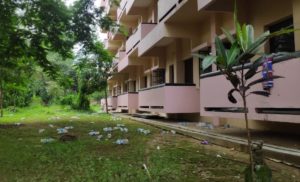
Meanwhile, I passed 3 days at NIT hostel. At the back of the mind, I was a bit tensed thinking about the outcome of my swab report. On the 4th day, we were suddenly called by one official to come down maintaining social distancing. I was great relieved to learn that I was tested negative. The official informed that I would now be allowed to proceed for home quarantine of 10 days. They put a seal on my hand. It was then that I realised that back at home, I have a small kid of 6 months and my parents are also aged. So I thought it unsafe to be in home quarantine. I then told the official that I want to go for paid quarantine in any hotel. Later on, after being convinced, the higher authorities allowed me to go for paid quarantine in JC International Hotel.
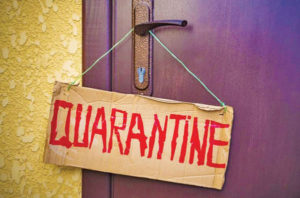 But I hardly knew at that moment that the greatest surprise of my life was awaiting. As I was ready to leave NIT hostel, the official called me and asked me to take the essential commodities provided for all those who were sent for home quarantine. I told the officer that I could very well afford to purchase the same. He then said, “Sir, this is our duty. Government has sanctioned essential commodities for all, irrespective of his/her financial status. You will have to take this.” For a moment, I was overwhelmed with the gesture exhibited by Assam government.
But I hardly knew at that moment that the greatest surprise of my life was awaiting. As I was ready to leave NIT hostel, the official called me and asked me to take the essential commodities provided for all those who were sent for home quarantine. I told the officer that I could very well afford to purchase the same. He then said, “Sir, this is our duty. Government has sanctioned essential commodities for all, irrespective of his/her financial status. You will have to take this.” For a moment, I was overwhelmed with the gesture exhibited by Assam government.
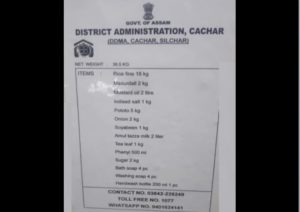
The next moment I saw a huge sealed packet given to me along with a check list. The packet contained fine Rice-18 kg, Mosur dal- 2 kg, Mustard oil- 2 litres, Iodised salt- 1 kg, Potato- 5 kg, Onion- 2 kg, Soyabeen- 1 kg, Amul Tazza Milk- 2 litres, Tea leaf- 1 kg, Sugar- 2 kg, phenyl- 500 mil, bathing soap- 4 pieces, washing soap- 4 pieces and a handwash bottle of 200 ml. It was for the first time in my life that I got anything from the government of my country. Along with me, 70 more inmates were allowed to go for home quarantine. All of them were provided the sealed packets of essential commodities.
 By the time, the district health department had arranged a vehicle to take me to the hotel. On reaching the hotel (paid quarantine), I was wondering that the facilities which the state government provided me at NIT quarantine centre were no less than that of the hotel. While writing this piece for way2barak sitting inside the hotel room, I just considered myself fortunate for being tested corona negative. The night which I spent in Kolkata Airport still haunts me. I would have no hesitation in asserting that, the way Assam government was looking after its residents during quarantine, big states like Maharashtra and West Bengal should learn how to fight a pandemic. I sign off by appealing to the people of my hometown to wear masks properly and follow social distancing religiously. I would fervently hope that ‘Live & let Live’ be the mantra for all of us at this hour of crisis.
By the time, the district health department had arranged a vehicle to take me to the hotel. On reaching the hotel (paid quarantine), I was wondering that the facilities which the state government provided me at NIT quarantine centre were no less than that of the hotel. While writing this piece for way2barak sitting inside the hotel room, I just considered myself fortunate for being tested corona negative. The night which I spent in Kolkata Airport still haunts me. I would have no hesitation in asserting that, the way Assam government was looking after its residents during quarantine, big states like Maharashtra and West Bengal should learn how to fight a pandemic. I sign off by appealing to the people of my hometown to wear masks properly and follow social distancing religiously. I would fervently hope that ‘Live & let Live’ be the mantra for all of us at this hour of crisis.





